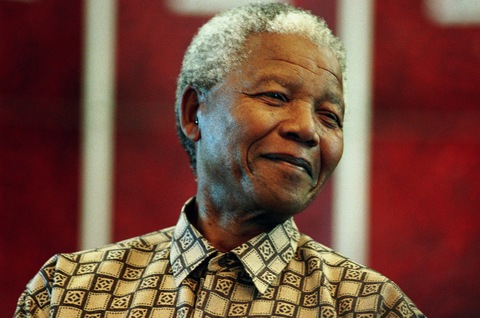Nelson Mandela Dies at 95
 Thursday, December 5, 2013 at 9:40PM
Thursday, December 5, 2013 at 9:40PM Nelson Mandela, the former political prisoner who became the first president of a post-apartheid South Africa and whose heroic life and towering moral stature made him one of history’s most influential statesmen, died Thursday, the government announced. He was 95.
The death was announced in a televised address by South African President Jacob Zuma, who added, “we’ve lost our greatest son.” No cause was provided.
Nelson Mandela, also known as Madiba, led the struggle to replace South Africa's apartheid regime with a multi-racial democracy. See key moments in his life.
To a country torn apart by racial divisions, Mr. Mandela became its most potent symbol of national unity, using the power of forgiveness and reconciliation to heal deep-rooted wounds and usher in a new era of peace after decades of conflict between blacks and whites. To a continent rife with leaders who cling to power for life, Mr. Mandela became a role model for democracy, stepping down from the presidency after one term and holding out the promise of a new Africa.
And to a world roiled by war, poverty and oppression, Mr. Mandela became its conscience, fighting to overcome some of its most vexing problems. He was a Nobel Peace Prize laureate who spent 27 years in prison as part of his lifelong struggle against racial oppression.
Throughout this moral and political fight, Mr. Mandela evoked a steely resolve, discipline and quiet dignity, coupled with a trademark big, charismatic smile. He ultimately carried them into office as South Africa’s first black president.
His victory capped decades of epic struggle by the African National Congress and other liberation groups against South Africa’s brutal white rulers, first under British colonialism and then under a white-run system called “apartheid,” or racial separation.
On the day of his inauguration — May 10, 1994 — Mr. Mandela stood at the podium near South Africa’s last apartheid-era president, F.W. de Klerk. A year earlier, they shared the Nobel Prize for what the Nobel committee called “their work for the peaceful termination of the apartheid regime, and for laying the foundations for a new, democratic South Africa.”
“We have, at last, achieved our political emancipation,” Mr. Mandela, then 75, declared. “Never, never and never again shall it be that this beautiful land will again experience the oppression of one by another . . . the sun shall never set on so glorious a human achievement.”
Only a few years before, the 20th century’s most celebrated political prisoner had been dubbed a terrorist by the conservative governments in the United States and Britain under Ronald Reagan and Margaret Thatcher, respectively.
In the decades following Mr. Mandela’s release from prison in 1990, many South Africans of all races referred to him reverentially as Madiba, his Xhosa clan name. Countless others called him Tata, which means father in the Xhosa language.
For all his achievements, Mr. Mandela will also be remembered as slow to react to the HIV/AIDS epidemic that began sweeping South Africa on his watch. It was not until 1998, four years into his presidency, that he directly addressed the South African public about the disease. Later, he would acknowledge that he had not initially recognized the severity of the epidemic.




Reader Comments